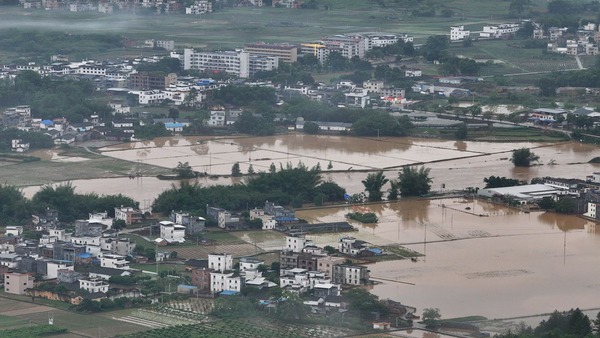Authorities have evacuated 110,000 people from their homes in Guangdong, as days of heavy rain caused massive flooding in China’s most populous province.
Four people have died so far, while 10 have gone missing, according to state media.
Footage on state media and online show large swathes of land inundated by the floods and rescuers ferrying people on lifeboats in waist-deep water.
Several major rivers have burst their banks, and authorities are closely monitoring “dangerously high” water levels.
They had warned that the level of a river in northern Guangdong could hit a “once in 100 years” peak on Monday morning, though this had yet to materialise by noon.
China’s summer of climate destruction
Much of Guangdong is part of the low-lying Pearl River delta, which is prone to floods due to the rise in sea levels and storm surges.
The delta is a major manufacturing base in China and one of the country’s most densely-populated regions, with Guangdong alone home to around 127 million people.
Provincial capital Guangzhou as well as smaller cities Shaoguan and Heyuan were among the worst hit.
Across the province about 1.16 million households lost power over the weekend, but 80% had their electricity restored by Sunday night.
According to China’s Xinhua news agency, at least 110,000 people have been evacuated, with some 25,800 in shelters.
Flights have been cancelled and delayed at Baiyun International Airport in Guangzhou due to continuous rain, while schools have been ordered shut in at least three cities.
Dozens of homes across the province have either collapsed or have been severely damaged, with authorities estimating a direct economic loss of nearly 140.6m yuan ($19.8m).
A river in Qingyuan city burst its banks and flooded an adjacent pier and roads
Videos shared online show fast-moving torrents collapsing walls and bridges.
A Weibo user said her family scrambled to move furniture from the first storey of their house to upstairs. “The heavy rains have flooded half of the first storey of our home,” the user wrote on Sunday night. “I wonder if the second storey would also be flooded overnight. I feel helpless.”
China’s meteorological authorities have warned that heavy rains will continue in Guangdong and coastal areas of neighbouring Fujian until at least Tuesday.
Last July, China’s capital Beijing and surrounding provinces such as Hebei were inundated with heavy rain and flooding after a series of typhoons from the Pacific Ocean made landfall in the country.
That week, Beijing experienced its heaviest rainfall in 140 years.





